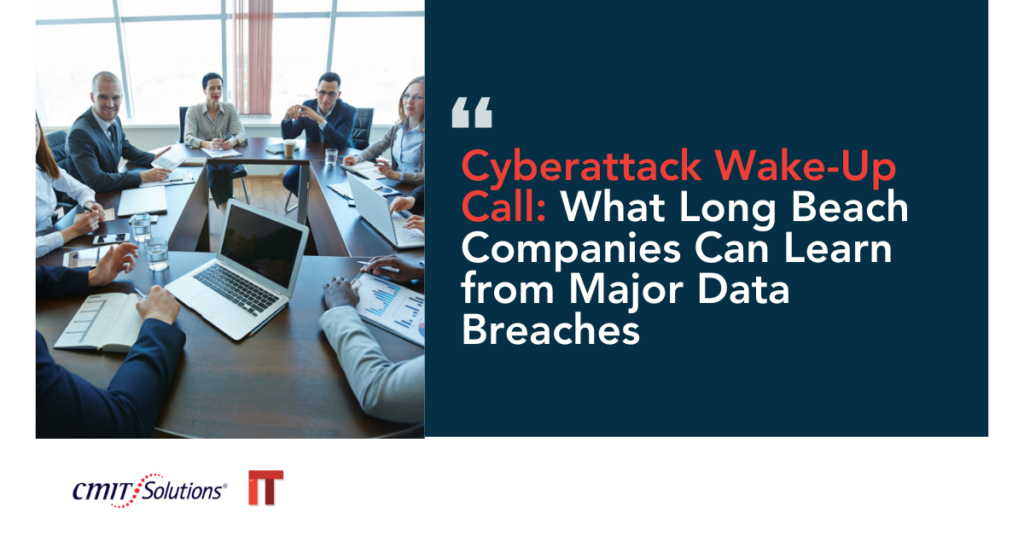Introduction: The Evolving IT Landscape and the Talent Crisis
In 2025, the digital landscape continues to evolve at breakneck speed, leaving many businesses struggling to keep up with the demand for tech talent. The IT skills gap, once a looming challenge, has now become a full-blown crisis. As new technologies like artificial intelligence (AI), zero trust architecture, and cloud-native platforms become the new normal, the demand for skilled professionals has skyrocketed—far outpacing supply. This shortage threatens not only innovation but also security, productivity, and long-term business viability.
For small and mid-sized businesses (SMBs), the situation is even more precarious. Many lack the resources to attract top-tier tech talent or the internal bandwidth to support complex IT infrastructures. This is where Managed Service Providers (MSPs) like CMIT Solutions of Long Beach step in as strategic partners, offering access to advanced IT capabilities without the burden of in-house staffing.
The IT Skills Gap: Why It’s Widening in 2025
The skills gap in IT isn’t just about coding or technical know-how—it’s about adapting to a rapidly changing environment. New threats emerge daily, cloud ecosystems become more intricate, and businesses are expected to pivot fast. But universities and training programs often lag behind industry needs, creating a pipeline problem.
This gap is further widened by the surge in remote work and hybrid operations, which have introduced new complexities around network security, compliance, and device management. With cyber threats growing more sophisticated, as seen in recent major breaches, businesses need expertise in risk management, encryption, MDR, EDR, and SIEM—skills that are in short supply.
According to industry reports, over 75% of businesses report challenges in hiring IT professionals with the right mix of experience and specialization. The global shift to hybrid work, rapid cloud adoption, and the growing sophistication of cyber threats have only widened this gap.
Some of the most in-demand but hardest-to-fill IT roles in 2025 include:
- Cybersecurity analysts – Experts in defending networks against ever-evolving threats.
- Cloud architects – Specialists in designing scalable, secure, and cost-effective cloud infrastructures.
- Data privacy officers – Professionals dedicated to maintaining compliance with regulations such as GDPR, HIPAA, and CCPA.
- AI and machine learning engineers – Technologists skilled in deploying intelligent systems.
- IT compliance specialists – Those who ensure systems meet legal and industry-specific standards.
The long hiring cycles, high salary expectations, and limited local talent pools have prompted businesses to seek alternative, reliable solutions.
Why MSPs Are the Answer
Managed Service Providers offer a compelling alternative to traditional hiring. Rather than trying to find, hire, and retain a highly specialized IT team, businesses can partner with MSPs who already have top-tier talent ready to deploy. MSPs bring a full suite of capabilities—from helpdesk support to advanced cybersecurity, network monitoring, and strategic consulting.
This is particularly vital for industries that require real-time responsiveness and uptime. For instance, Long Beach healthcare providers benefit significantly from strong MSP partnerships that support HIPAA compliance, ensure data integrity, and offer scalable support without constant hiring headaches.
Managed Service Providers have stepped up as a strategic solution to the IT talent crisis. Rather than relying on lengthy hiring processes, companies can tap into an MSP’s diverse bench of certified experts ready to provide instant support. MSPs offer:
- Round-the-clock monitoring and support
- Proactive cybersecurity protection
- Cloud migration and optimization services
- Compliance advisory and risk assessments
- Strategic IT planning and consulting
AI, Automation, and the Role of MSPs
One of the key reasons businesses turn to MSPs is to leverage the power of AI and automation without needing in-house data scientists or engineers. Modern MSPs have begun integrating AI-powered threat detection and network management tools into their offerings, as illustrated by the surge in AI-powered IT support.
These tools enhance efficiency and reduce the need for reactive troubleshooting, allowing businesses to benefit from predictive insights and proactive maintenance. MSPs also serve as a bridge between legacy systems and modern AI-driven infrastructure, helping companies evolve without disrupting their operations.
Filling the Cybersecurity Void
Cybersecurity is one of the most critically underserved areas in IT talent. With ransomware attacks, phishing scams, and zero-day vulnerabilities on the rise, the need for skilled cybersecurity professionals has never been greater. However, the cost of hiring a full-time CISO, security analyst, and compliance expert is often prohibitive for small businesses.
MSPs like CMIT Solutions of Long Beach help fill this void with layered protection strategies, including endpoint detection, real-time monitoring, and security audits. They help companies implement best practices such as zero trust frameworks and robust cloud security policies, ensuring businesses remain resilient in the face of evolving threats.
Proactive Support vs. Reactive Repairs
Many organizations still operate on a break-fix model, where IT is only called upon when something breaks. But this approach is both costly and risky. Downtime can damage reputation, result in data loss, and lead to compliance violations.
MSPs offer proactive monitoring and predictive maintenance, identifying issues before they escalate. This proactive approach is central to building resilience and reliability. As highlighted in CMIT’s blog on IT downtime, having an MSP that keeps watch 24/7 ensures systems run smoothly, freeing internal teams to focus on core business tasks.
Bridging the Cloud and Compliance Divide
Cloud adoption has become ubiquitous, but so have its challenges. From sprawl and shadow IT to inconsistent access controls, businesses often lack the in-house expertise to manage cloud environments securely and efficiently. MSPs not only help with secure migration and ongoing maintenance but also optimize usage to reduce costs, as explained in this guide to cloud sprawl.
Moreover, MSPs offer built-in compliance support for standards such as HIPAA, PCI-DSS, and SOC 2. For instance, healthcare organizations can develop a stronger compliance strategy by leveraging MSPs that understand both local regulations and national standards.
Empowering Business Growth Through Technology
MSPs aren’t just IT service providers—they are growth enablers. By giving SMBs access to enterprise-grade tools and infrastructure, MSPs help businesses scale efficiently and securely. Whether it’s implementing collaborative platforms, virtual desktops, or unified communications, the right technology can unlock massive productivity gains.
As noted in CMIT’s growth-focused blog, businesses that leverage smart technology partnerships grow faster and operate more efficiently than those that try to manage everything internally.
Customized Support for Startups and Entrepreneurs
Startups often struggle with balancing growth and operational efficiency. They need robust IT support but can’t afford large teams. This is where customized IT packages from MSPs prove invaluable. These packages are designed to scale with the business and evolve alongside it.
By offering startup-friendly pricing, tailored support, and flexible service agreements, MSPs help founders focus on innovation while resting assured that their tech is secure and scalable. Learn more about how customized IT packages support startup growth in Long Beach and beyond.
MSPs and the Future of Work
As we move further into the hybrid and remote era, MSPs are playing a pivotal role in enabling seamless collaboration. From deploying secure VPNs to implementing communication platforms, MSPs ensure remote teams stay productive and protected.
The emphasis is now on integrated solutions—where communication, file sharing, and project management tools work in harmony. As demonstrated in CMIT’s blog on unified communications, MSPs are driving this transformation by unifying tools and managing backend complexity.
Supporting Business Growth and Scalability
As companies scale, so do their IT needs. MSPs support this growth by providing scalable IT infrastructure, cloud solutions, and tailored service packages. Learn how businesses are driving growth with smart technology in Driving Growth in Long Beach.
Whether launching a new location, adding remote workers, or expanding globally, MSPs ensure your IT backbone is ready to grow with you.
Conclusion: Rethinking Talent Through Strategic Partnerships
The IT skills gap isn’t going away anytime soon. In fact, with the advent of new technologies and increasing regulatory pressures, it’s poised to widen even further. But instead of falling behind, businesses can move forward by partnering with MSPs who provide expertise, flexibility, and innovation.
CMIT Solutions of Long Beach serves as a prime example of how MSPs are redefining what it means to have an IT team in 2025. From cloud optimization and cybersecurity to strategic consulting and AI integration, MSPs empower businesses to overcome limitations and thrive in a competitive landscape.
If you’re facing IT challenges or struggling with tech talent shortages, now is the time to rethink your strategy. A trusted MSP isn’t just a service provider—they’re a partner in your success story.





